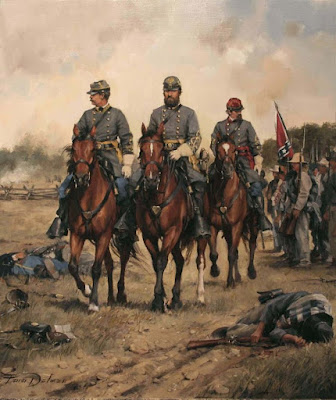May 2, 1863: Stonewall Jackson is wounded by friendly fire while returning to camp after reconnoitering during the Battle of Chancellorsville
Throughout 1863, Robert E. Lee fought back against the Union
advance toward Richmond. The Peninsula Campaign, was Union General George B. McClellan’s
attempt to seize the Confederate capital of Richmond. Confederate President
Jefferson Davis promoted his military advisor, Robert E. Lee to take command of
the army and push back McClellan. Lee was able to push back McClellan at the
Battle of Seven Pines; however, the battle would prove not only to be a
watershed moment for Lee but also for another of his generals. During the
battle, troops under the command of Thomas “Stonewall” Jackson led the charge
against the Union soldiers. Jackson cut a very interesting figure. He was an uncompromising
hypochondriac. He would suck lemons in the heat of battle, and keep one arm
lifted because he felt it kept “the blood balanced.” However even with all of
quirks, he was a brilliant tactician, with an utter disregard for the lives of
his soldiers. But his soldiers loved him because he brought them victories. He earned
the moniker “Stonewall,” because during the Battle of First Bull Run, his regiment
stood “as a stonewall” during withering Union fire. Throughout the Spring of 1862,
Lee and Jackson would battle union forces into submission. Lee would unsuccessfully
attempt to invade the North, being repulsed at the Battle of Antietam. In the
Winter of 1863, Lee would reengage Union forces at the Battle of Fredericksburg.
The Battle would prove to be one of Lee’s and Jackson’s greatest victories.
That April, Lee would attack Union forces at Chancellorsville.
In 1863, Abraham Lincoln appointed Joseph Hooker as overall
commander of Union forces. In April, Hooker rode down into Virginia to link up with
his army. The army was still reeling for its defeat at the Battle of Fredericksburg.
Lee’s Confederates were still garrisoned at Fredericksburg but when he received
word that Union forces were gathering at nearby Chancellorsville, he dispatched
his army to the small Virginia town. Lee decided to divide his forces and attack
Hooker’s army from both sides. He gave Jackson the honorary task of attacking
the army on its flank. Jackson’s troops caught the Union soldiers completely
off guard. The surprise attack nearly overwhelmed Union soldiers, but by the
afternoon, they were able to reestablish their lines. That night Jackson went
out to reconnoiter his lines. As he was headed back, his own soldiers mistook him
for a Union picket and opened fire. The bullets ripped through his body. He was
taken to nearby field hospital to have his mangled arm amputated. Lee was devested
at the lose of such an able field commander. Jackson stayed in hospital for many
days, eventually developing pneumonia. He succumbed to the illness nine days
later.




Comments
Post a Comment